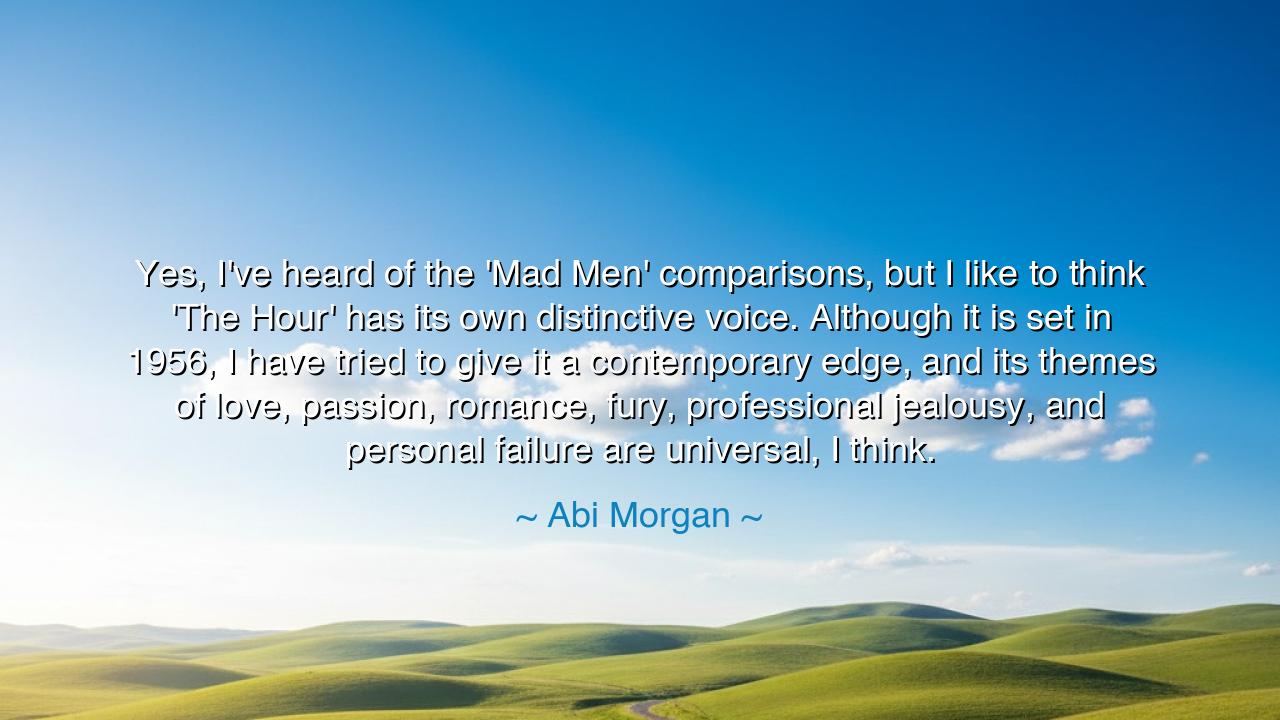
Yes, I've heard of the 'Mad Men' comparisons, but I like to think
Yes, I've heard of the 'Mad Men' comparisons, but I like to think 'The Hour' has its own distinctive voice. Although it is set in 1956, I have tried to give it a contemporary edge, and its themes of love, passion, romance, fury, professional jealousy, and personal failure are universal, I think.






“Yes, I've heard of the 'Mad Men' comparisons, but I like to think 'The Hour' has its own distinctive voice. Although it is set in 1956, I have tried to give it a contemporary edge, and its themes of love, passion, romance, fury, professional jealousy, and personal failure are universal, I think.” Thus spoke Abi Morgan, the playwright and screenwriter, whose gift is to weave words into stories that cut through time itself. Her declaration is not merely about a television drama—it is about the enduring power of narrative, and how the struggles of men and women, though shaped by the years, remain the same in every age.
The meaning of her words is that while art may be dressed in the garments of a particular era, its heartbeat is timeless. Morgan’s series The Hour, set in 1956, unfolds in the shadow of history, yet the emotions it depicts—love, passion, romance, fury, professional jealousy, personal failure—are not bound to that year alone. They are the threads of the human condition, stretching backward into the past and forward into the future. What she reminds us is that though centuries may pass and the world may change its face, the soul of humanity wrestles with the same eternal fires.
The ancients knew this truth well. Sophocles, writing of Oedipus, explored themes of pride, failure, and fate that still resonate today. Shakespeare, centuries later, clothed men and women in Elizabethan attire, yet their jealousy, ambition, and passion still burn in modern hearts. So too, Morgan sets her tale in the mid-twentieth century, but her artistry lies in revealing the universality of these struggles. It is not the setting that makes the story alive, but the truths of humanity that dwell within it.
Consider the story of Euripides’ Medea—a tale of love betrayed, passion turned to fury, and jealousy so sharp it consumes all. Though written two and a half millennia ago, its themes still pierce us today. We may live in the digital age, but the pang of betrayal, the sting of envy, the bitterness of failure—they are unchanged. Morgan’s reflection, like that of the ancients, reminds us that art becomes timeless when it embraces the universal themes that bind all generations together.
Yet Morgan also adds a crucial insight: the need for a distinctive voice. She acknowledges comparisons to Mad Men, yet insists that The Hour must stand on its own. This is a lesson in the courage of creation. For in every age, the artist is tempted to mimic, to repeat the formulas that brought success to others. But true greatness lies not in imitation, but in originality—in daring to speak with one’s own voice, to bring forth one’s own vision. The ancients admired this too: Homer did not write like Hesiod, nor did Dante echo Virgil without transforming his voice into something new. Each great creator must carve their own path.
The lesson for us, then, is twofold. First, recognize that your struggles are not yours alone. The trials of love and envy, ambition and failure, are shared by all, across cultures and centuries. When you suffer, remember you walk the same road as those before you, and their stories may teach you strength. Second, when you create—whether in art, work, or life—do not merely copy the voices around you. Find your distinctive voice, your own way of telling truth, and trust that by doing so, you will touch the timeless and the universal.
So let Abi Morgan’s words echo as a beacon to all who tell stories and all who live them: “Its themes are universal.” For the world will always change its clothing, but the heart of man remains the same. If you live with courage, if you love with passion, if you rise from failure with humility, you will find yourself part of a story as old as time and as fresh as today. And in that story, you will discover both your own voice and the eternal chorus of humanity.






AAdministratorAdministrator
Welcome, honored guests. Please leave a comment, we will respond soon